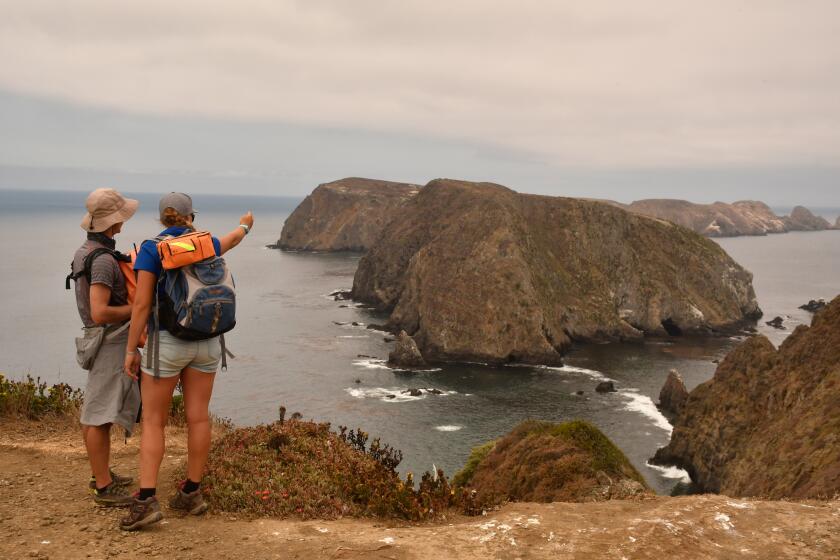Making a Bid to End a Bloody Cycle : Violence: Latino gang members meet at USC to talk of Brown Pride and to seek ways to stop the murderous rivalries.
- Share via
They came from East Los Angeles, Whittier, Echo Park, Pomona and El Monte, most of them battle-scarred gang members hoping to escape the bloody cycle that has torn their neighborhoods for generations.
Gathered for nearly eight hours Wednesday at the USC campus, they talked of Brown Pride, of what it means to be Chicano, of how to sever the deep roots that have kept la raza locked in a violent, self-destructive battle.
When it was all over and the young tattooed men returned to their respective barrios, there was no truce or peace treaty to flaunt. But for at least one day, for at least two dozen Latino gang members, there was a moment of sanity in the often insane world they traverse--a kernel of hope that murder need not be a way of life.
“I was kind of tense when I came here,” conceded Johnny Martinez, 19, a burly gang member with a stubbly goatee. “But this little meeting is breaking the ice. It’s bringing us out little by little . . . challenging us to put down our pride and show each other respect.”
The meeting, organized by a group of community activists and Los Angeles County probation officers, was dubbed the Chicano Youth Leadership Conference. But it was also believed to be the first Latino gang summit since most black gangs in South Los Angeles halted their brutal rivalries.
Latino activists resist any comparisons to the Bloods and Crips, insisting that they are trying to forge their own path to peace rather than following the footsteps of others. Still, as black gang homicides have declined, Latino gang killings have soared, raising questions about what is being done to stem the tide of barrio warfare.
Last year, in communities patrolled by the Los Angeles Police and Los Angeles County Sheriff’s departments, 179 blacks were slain in gang-related homicides. During that time, 340 Latinos died.
“Let’s stop killing our own raza, “ declared a banner that was hung at the USC Religious Center where Wednesday’s meeting was held. Below that appeal, there was a picture of a gang member cradling a dying friend in a pool of blood, surrounded by the words: “Brown . . . Why? . . Stop!”
Organizers were disappointed that only about half as many gang members as expected showed up, a fact they attributed to several long-simmering rivalries that lately have turned hot. In a county with more than 500 Latino gangs, fewer than a dozen were represented.
“This is less than a drop in the bucket, in terms of what’s going on out there,” said Mike Duran, director of specialized youth services for the county Probation Department. “But it’s still very significant to have a group of Chicanos here, talking about things that ought to be instead of what are.”
The meeting--which featured speeches from Gil Garcetti, a candidate for district attorney, and sheriff’s chief Lee Baca, the highest-ranking Latino in the department--delivered strong doses of cultural pride, spiritual strength and faith in the value of education to get misdirected youths back on track.
MC Boulevard, a former gang member from Highland Park, offered a message of nonviolence, rapping about a slain friend in a song entitled “I Remember You, Homie.” Baca told of growing up in a garage in East Los Angeles, while Garcetti talked of being raised by a father who used to be a gang member.
“You can commit self-destruction by throwing the finger at everybody,” Gus Frias, a criminal justice and education specialist for the county office of education, told the group. “But if we give up, who loses and who wins? The answer to your pain is not going across the street and killing another innocent raza brother or sister.”
Although several of the youths acknowledged that it would be difficult to apply all of the day’s lessons to the reality of survival in the barrio, most said they were comforted by having connected with a group of concerned adults, almost all of them Chicanos who had to struggle growing up on the streets.
“I can’t say something’s going to happen right away,” said a 17-year-old member of an Echo Park gang. “But it’s nice to hear older people say they care, especially when most adults look down at us.”
More to Read
Sign up for Essential California
The most important California stories and recommendations in your inbox every morning.
You may occasionally receive promotional content from the Los Angeles Times.













